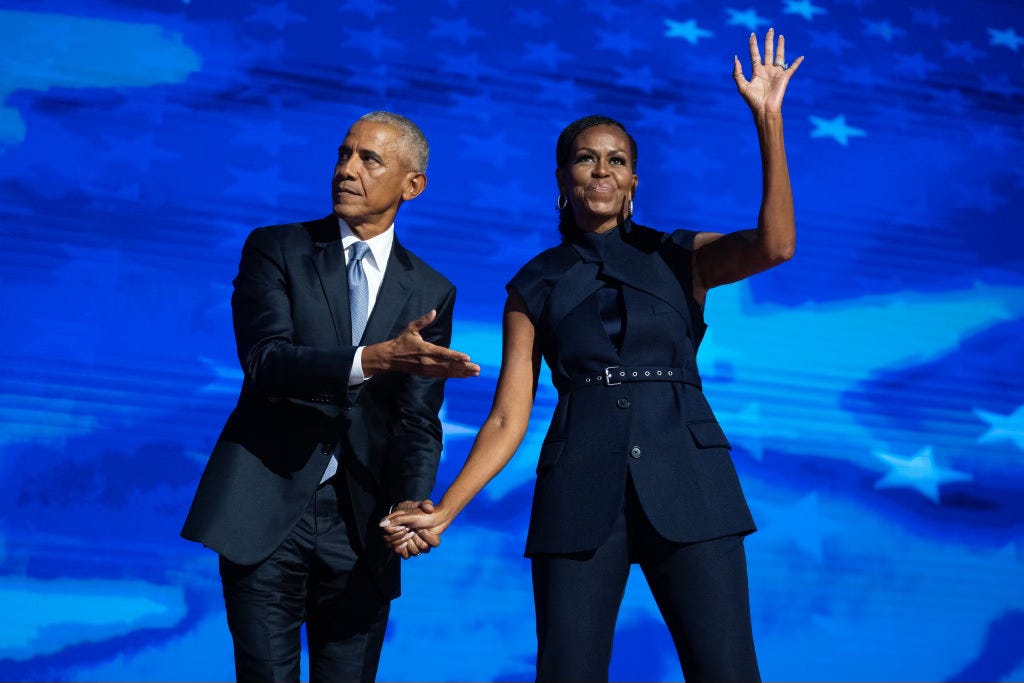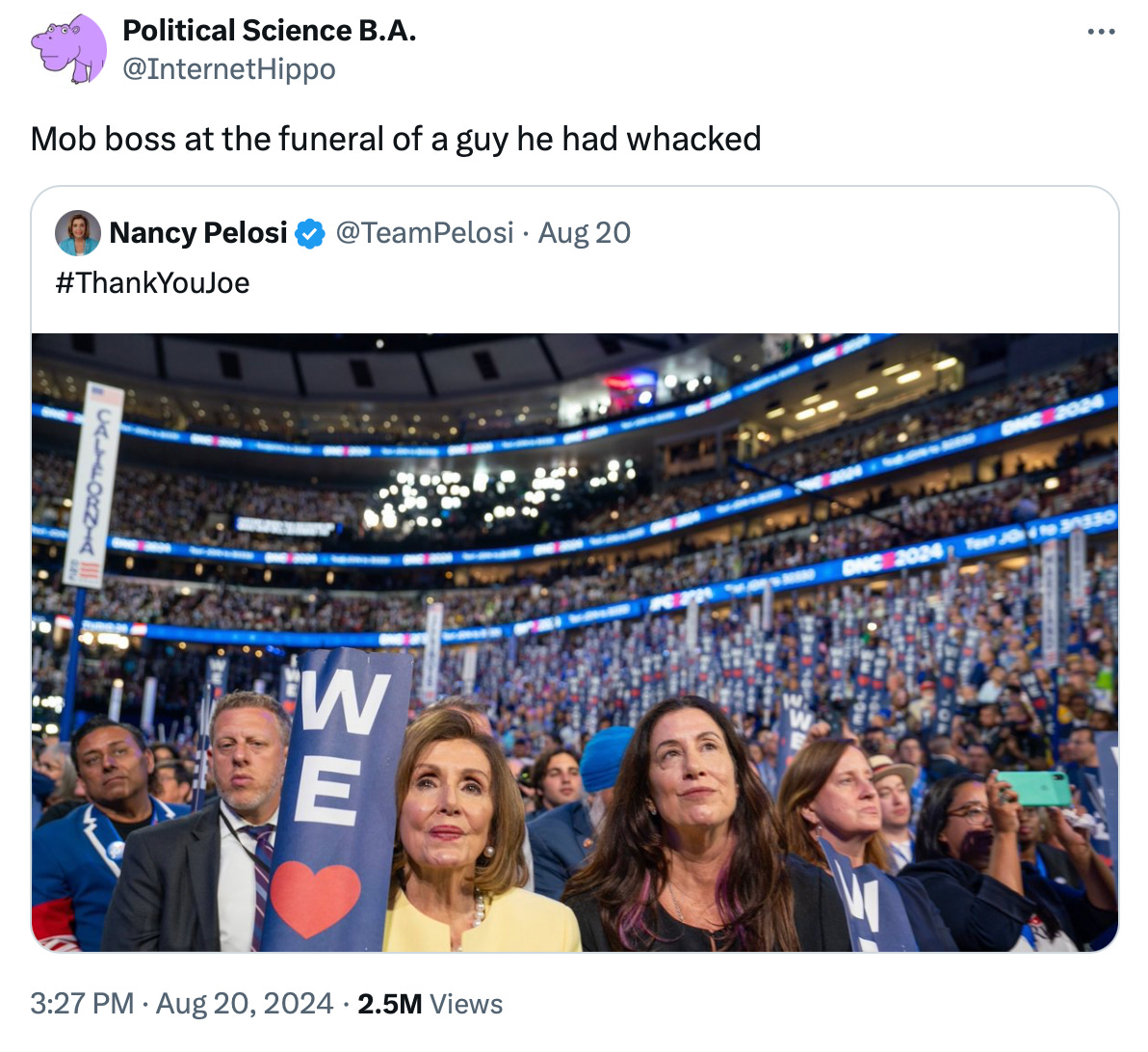“When they go low, we go high.” It was an inspiring mantra. It is a mantra that explains how Barack and Michelle Obama were able to rise to the political heights they were, ever retaining their dignity even in the face of withering, baseless attacks.
But I always felt it wasn’t a mantra for how America should cope with rising fascism. It was a personal mantra for personal life. How you should conduct yourself with a meanie in school, perhaps.
For all the admiration of Michelle Obama out there, this line in recent years has become something many Democrats quietly hiss at. They don’t like it anymore. They feel as though it actually captured something about how Democrats fight, which is to say, sometimes, not fight. And they want the mantra revised, or even overthrown.
Last night, the Obamas revised the mantra.
This post is free for everyone, but the interviews and essays we share here take research and editing and much more. Join us today to support the kind of independent media you want to exist.
Michelle Obama came out swinging, ripping Trump so many new ones that a slice of him would fit right in on J.D. Vance’s Philly cheesesteak. There were so many good lines in there, but I thought these, among her subtlest, were absolutely vicious at the same time.
Most of us will never be afforded the grace of failing forward. We will never benefit from the affirmative action of generational wealth.
If we bankrupt a business — if we bankrupt a business or choke in a crisis, we don’t get a second, third or fourth chance. If things don’t go our way, we don’t have the luxury of whining or cheating others to get further ahead. No.
We don’t get to change the rules so we always win. If we see a mountain in front of us, we don’t expect there to be an escalator waiting to take us to the top. No.
We put our heads down. We get to work.
But it was Barack Obama who most decisively shook off the “going high” mantra, with the most consequential hand gestures (and brief glimpse down at those hands) in the history of party conventions.
Two more brief notes on the Obamas.
In Michelle’s talk, interestingly, she engaged in something we have discussed more than once in this newsletter: prebunking.
Vice President Kamala Harris, as she runs for president, has the advantage of drafting behind the Obamas, who came before and who have experienced what she will as a Black woman in a racially fraught moment.
Last night, Michelle Obama made use of her experiences to warn people of what would befall Harris — and to be more prepared for it than anyone could have been when it was the Obamas’ go-around.
Now, unfortunately, we know what comes next. We know folks are going to do everything they can to distort her truth. My husband and I sadly know a little something about this…
So if they lie about her, and they will, we’ve got to do something.
And, finally, in Barack Obama’s speech, there was another stretch that I thought was significant because its target wasn’t Trump or the extreme right. He turned the lens on us, on our collective culture, on how our own choices have created a society ripe for enterprisingly cynical power grabbers. And he reminded Americans that we all need to change to beat back these forces.
We live in a time of such confusion and rancor, with a culture that puts a premium on things that don’t last: money, fame, status, likes. We chase the approval of strangers on our phones. We build all manner of walls and fences around ourselves, and then we wonder why we feel so alone. We don’t trust each other as much because we don’t take the time to know each other. And in that space between us, politicians and algorithms teach us to caricature each other and troll each other and fear each other.
He also had wise words about the need for what I call civic grace: the need to have a little patience with people for whom change is coming fast, who struggle to cope or keep up but are fundamentally decent:
To make progress on the things we care about, the things that really affect people’s lives, we need to remember that we’ve all got our blind spots and contradictions and prejudices. And that if we want to win over those who aren’t yet ready to support our candidates, we need to listen to their concerns and maybe learn something in the process.
After all, if a parent or grandparent occasionally says something that makes us cringe, we don’t automatically assume they’re bad people. We recognize that the world is moving fast, that they need time and maybe a little encouragement to catch up. Our fellow citizens deserve the same grace we hope they’ll extend to us. That’s how we can build a true Democratic majority, one that can get things done.
As we’ve written before, the addition of Tim Walz to the ticket — as a relatable exemplar to those who might otherwise struggle to adapt — is one step on this path forward together. Showing people a vision of just how fun and inviting that future can be to everyone is another. The cliché hedge to say here would be that this type of change always takes time. But in just a few short weeks, the Democrats have decisively shown that, actually, they are capable of adapting and moving much faster than we ever thought possible. Hopefully, they can keep this momentum going.
More from our DNC 2024 coverage
With his travel plans stymied by foul weather, Anand gathered his thoughts on what (and who) is behind the recent changes in Democratic campaign strategy.
After some delays, Anand makes a pre-dawn pit stop to talk at MSNBC en route to Chicago and recaps some highlights from day one.
With his feet on Chicagoan ground, Anand peels back the curtain on the parts of the DNC that aren’t televised.
What a zoomer-organized DNC afterparty tells us about the direction of the party as a whole.
Other readings
New Yorker cartoonist Liza Donnelly draws the DNC.
Vox explains the subtext behind Michelle Obama’s statement that “hope is making a comeback” under Harris’s candidacy. President Biden might not like to hear it, but that doesn’t make it any less true.
And in other news, Joyce Vance warns us not to look away from ongoing voter suppression efforts in Georgia while Judd Legum at Popular Information breaks down how fact-checking is undermined by the desire to appear neutral to both sides.
Meanwhile on Twitter, Aaron Rupar of Public Notice put together this comprehensive thread with all the highlights of the evening—including this ruthless and effective montage of Trump and Vance being dangerously weird. And @InternetHippo provides a Macchiavellian reading of a recent Nancy Pelosi tweet:
For a less trite take on this situation, check out Jay Caspian Kang’s close reading of Pelosi’s recent memoir over at The New Yorker.
Photo by Tom Williams/CQ-Roll Call, Inc via Getty Images
This post was originally published on The.Ink.


